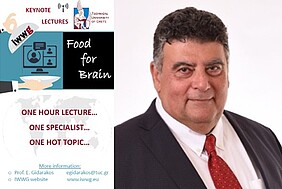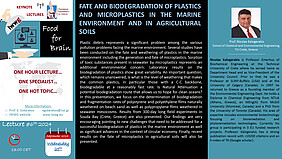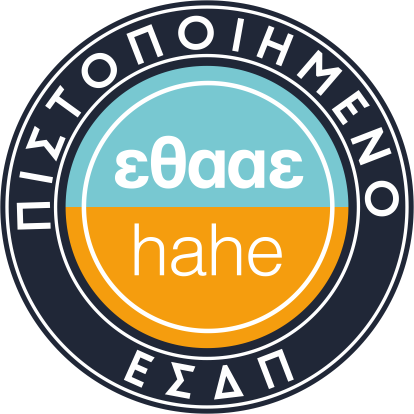Ο Ομ. Καθηγητής του Πολυτεχνείου Κρήτης κ. Ευάγγελος Γιδαράκος, συνεχίζει και φέτος την υλοποίηση διαδικτυακών διαλέξεων σε φλέγοντα θέματα διαχείρισης αποβλήτων, με τίτλο "FOOD for BRAIN".
Την Τετάρτη 25 Σεπτεμβρίου 2024 και ώρα 13:00 CET (14:00 ώρα Ελλάδος) ο Ομ. Καθηγητής Νικόλαος Καλογεράκης της Σχολής Χημικών Μηχανικών και Μηχανικών Περιβάλλοντος του Πολυτεχνείου Κρήτης, ως προσκεκλημένος εισηγητής της δράσης "FOOD for BRAIN" για τον Σεπτέμβριο, θα παρουσιάσει τις νέες προκλήσεις που πρέπει να αντιμετωπιστούν για την επιτυχή βιοαποδόμηση των πλαστικών στο θαλάσσιο περιβάλλον, καθώς και τις σημαντικές προόδους στο πλαίσιο της κυκλικής οικονομίας. Επίσης, θα παρουσιαστούν πρόσφατα αποτελέσματα για την τύχη των μικροπλαστικών σε γεωργικά εδάφη.
Η ομιλία του έχει τίτλο: «Τύχη και βιοαποδόμηση πλαστικών και μικροπλαστικών στο θαλάσσιο περιβάλλον και στα γεωργικά εδάφη»
Συμμετοχή μπορεί να πραγματοποιηθεί μέσω του ακόλουθου συνδέσμου:
Τίτλος
Fate and biodegradation of plastics and microplastics in the marine environment and in agricultural soils
Περίληψη
Plastic debris represents a significant problem among the various pollution problems facing the marine environment. Several studies have been conducted on the fate and weathering of plastics in the marine environment including the generation and fate of microplastics. Sorption of toxic substances present in seawater by microplastics represents an additional environmental concern. Laboratory results on the biodegradation of plastics show great variability. An important question, which remains unanswered, is what is the level of weathering that makes the common plastics, in particular those with a C-C backbone, biodegradable at a reasonably fast rate. Is Natural Attenuation a potential biodegradation route that allows us to hope for clean oceans? In this presentation, we focus on the determination of biodegradation and fragmentation rates of polystyrene and polyethylene films naturally weathered on beach sand as well as polypropylene films weathered in seawater mesocosms. Results from 300-day long field experiments in Souda Bay (Crete, Greece) are also presented. Our findings are very encouraging pointing to new challenges that need to be addressed for a successful biodegradation of plastics in the marine environment as well as significant advances in the context of circular economy. Finally, recent results on the fate of microplastics in agricultural soils will also be presented.
Βιογραφικό
Nicolas Kalogerakis is Professor Emeritus of Biochemical Engineering at the Technical University of Crete where he served twice as Department Head and as Vice-President of the University Council. Prior to that he was a Professor at SUNY-Buffalo (USA) and at the University of Calgary (Canada). In 1997 he returned to Greece as a founding member of the Environmental Engineering Dept. He holds a Diploma in Chemical Engineering from NTUA (Athens, Greece), an MEng(A) from McGill University (Montreal, Canada) and a PhD from the University of Toronto (Canada). His area of expertise includes environmental biotechnology focusing on bioremediation and phytoremediation technologies. Currently his group is participating in 3 EU funded research projects. Professor Kalogerakis has a strong publication record with >19200 citations and an h-index of 76 (Google scholar).
















